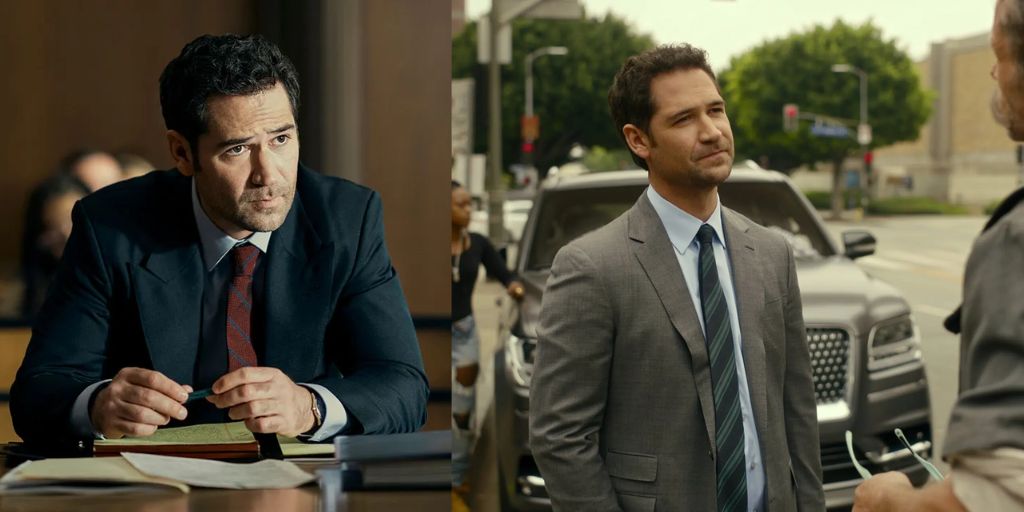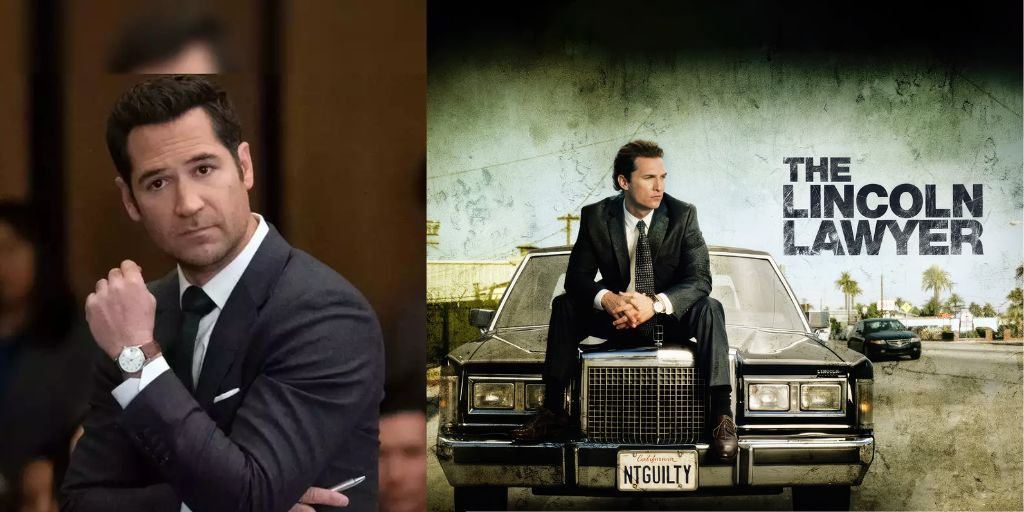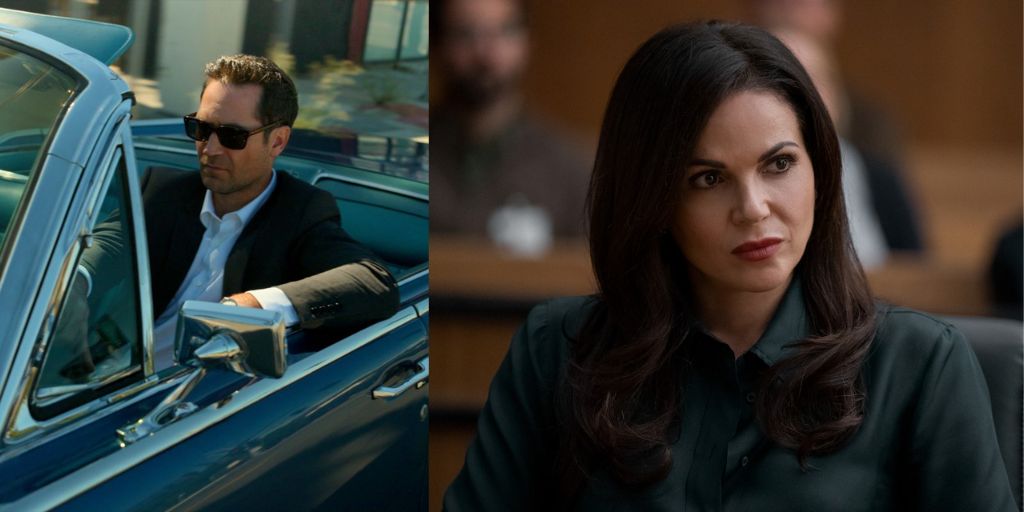Season 3 of The Lincoln Lawyer offers a gripping continuation of Mickey Haller’s story, delivering some of the best features that made previous seasons successful. The new batch of episodes brings unexpected plot twists and deep character arcs that keep fans engaged.
However, despite these strengths, the season also stumbles at times, primarily due to weak subplots and its over-reliance on Mickey Haller as the central figure. While this works well to some extent, it leaves many other characters underdeveloped, leading to mixed results.
The season kicks off by picking up on a cliffhanger that fans didn’t expect. Mickey Haller (played by Manuel Garcia-Rulfo) finds himself in a tough position when his close friend Glory Days (Fiona Rene) is found murdered. The only suspect in the case is her friend, Julian La Cosse (Devon Graye). This situation puts Mickey in a moral dilemma: he must defend someone who may be innocent, but at the same time, he can’t shake the feeling that he might be helping a killer.
Mickey’s character is well-established in previous seasons, and Season 3 continues to build on his personal and professional struggles. He mourns the brutal murder of Glory Days while also juggling his duties as a father, his career as a defense attorney, and the resurfacing of unresolved issues from his past.
For fans of The Lincoln Lawyer, the return of the show’s familiar tone and courtroom drama will feel reassuring. The structure remains similar to earlier seasons, with episodes focused on unfolding legal battles and Mickey’s attempts to defend his clients. However, one issue becomes clear early on: the main case of the season lacks the intrigue of its predecessor.
In Season 2, viewers were constantly left in doubt about the innocence of Lisa Trammell (Lana Parrilla), and this uncertainty drove the tension throughout the season. This time, Julian La Cosse’s case doesn’t carry the same weight. His innocence feels almost certain from the start, leaving little room for the suspense that made Season 2 so compelling.
The lack of tension around La Cosse’s case isn’t just a minor problem. For a character who plays such a prominent role in the season, La Cosse remains somewhat of a mystery. The show doesn’t offer enough backstory or details about his life to make viewers care deeply about his fate.
If the show had developed his character more fully, his story could have had a much greater emotional impact. Instead, he becomes just another client for Mickey, rather than a figure whose innocence or guilt we genuinely care about. This is one of the season’s missed opportunities.

Another storyline that suffers from underdevelopment is that of Andrea Freeman (played by Yaya DaCosta). Andrea, a prosecutor, returns this season to take on a case that spirals far beyond her control. In this arc, we see her grappling with a major mistake that threatens to haunt her for the rest of her career.
Andrea’s storyline is among the most engaging parts of the season, and Yaya DaCosta delivers a strong performance that showcases the inner turmoil of a woman on the brink of collapse. Her desperation is palpable, and it’s impossible not to get emotionally invested in her character.
Unfortunately, the show doesn’t give Andrea’s arc the attention it deserves. Much like La Cosse, her storyline feels sidelined in favor of Mickey’s. One of the most significant criticisms of Season 3 is its singular focus on Mickey Haller. While Mickey is the protagonist and his story is central to the series, this season misses the chance to find the supporting characters in more depth.
For instance, Lorna (played by Becki Newton) struggles with anxiety over her upcoming bar exam, a subplot that could have been found more meaningfully. Newton excels at balancing dramatic and comedic moments, but the show reduces Lorna’s arc to a series of jokes.
This subplot had the potential to become a compelling part of the season, especially since Lorna has been a background character for much of the show. With future seasons potentially on the horizon, it would be refreshing to see Lorna get a more substantial role.
The same can be said for several other female characters in the series. Mickey’s daughter, Hayley (Krista Warner), has a personal connection to one of his cases. This development could have introduced significant conflict and emotional depth, but instead, her involvement is barely touched upon.
Hayley’s storyline is forgotten for much of the season, only resurfacing as an afterthought in the finale. Similarly, Izzy (Jazz Raycole), who was once Mickey’s driver, moves on to other endeavors. The show hints at her growing interest in paralegal work, but it doesn’t fully find her new path. By neglecting these characters, the season loses out on opportunities to add complexity to its narrative.
However, it’s not all bad news for The Lincoln Lawyer fans. Despite its weaknesses, Season 3 does have its strong points. One of the highlights is the introduction of Eddie Rojas (played by Allyn Moriyon), who brings a fresh dynamic to the show.
Eddie’s character adds a different tone to the episodes, though, much like others, he is somewhat forgotten by Mickey and the main cast as the season progresses. Holt McCallany (known for The Iron Claw) also delivers a standout performance in the latter part of the season. His role may not be large, but when he does appear, he makes a significant impact on the story.
Although the primary case in Season 3 doesn’t have the same level of twists and surprises as earlier cases, the show still succeeds in showing how a legal defense is built from the ground up. Watching Mickey navigate the challenges of the courtroom, preparing his defense, and slowly piecing together the puzzle is satisfying. The series maintains its ability to depict the intricacies of legal strategy, and this remains one of the core strengths of The Lincoln Lawyer.

Manuel Garcia-Rulfo continues to carry the show as Mickey Haller. His portrayal of the confident, sometimes arrogant, defense attorney is as strong as ever. Mickey’s charm and quick wit remain integral to the show’s appeal.
However, his character’s dominance also underscores one of the season’s major flaws: the series seems hesitant to move beyond Mickey’s story and give other characters a chance to shine. This results in a somewhat one-dimensional narrative that fails to fully capitalize on its ensemble cast.
One of the biggest problems with Season 3 is its reliance on exposition. At times, the show doesn’t seem to trust its audience to remember key details or follow the story without constant reminders. This leads to repetitive dialogue and scenes where information is rehashed unnecessarily. This issue becomes especially noticeable when binge-watching the series.
Repeated exposition slows down the pacing and detracts from the enjoyment of the show. Another recurring problem is that the show feels the need to emphasize Mickey’s successes during cross-examination by showing the reactions of other characters, as if the audience wouldn’t grasp the significance of his legal victories without these cues.
Despite its shortcomings, The Lincoln Lawyer remains an entertaining series for fans of courtroom dramas and murder mysteries. Season 3 may not offer the strongest case or the most complex characters, but it still provides enough drama and intrigue to keep viewers hooked.
The show’s ability to craft a compelling legal battle and unravel the intricacies of a murder case is still very much intact. While the season fumbles several storylines, it’s hard to deny that the show retains its entertainment value.
One of the biggest missed opportunities of Season 3 is the lack of character development for anyone other than Mickey Haller. Many of the supporting characters have the potential for deeper arcs, but they are sidelined in favor of Mickey’s personal and professional struggles.
Lorna, Hayley, Izzy, and Andrea all deserve more screen time and attention. Their stories, while promising, are not given the space to grow and grow in meaningful ways. This issue leaves the season feeling unbalanced, as Mickey’s character takes up most of the narrative real estate, while others are left in the background.
Another aspect of Season 3 that could have been improved is the pacing. While the legal drama and courtroom scenes are engaging, the episodes sometimes feel stretched out. The main case lacks the complexity and uncertainty that made previous seasons so compelling, which means there’s less incentive to keep hitting the “next episode” button. The tension that was present in Season 2 is notably absent this time around, and this affects the momentum of the season.
Still, Season 3 manages to pull off some memorable moments. The emotional weight of Glory Days’ murder and Mickey’s internal conflict as he defends Julian La Cosse adds a layer of depth to the season. Mickey’s struggle to balance his personal grief with his professional obligations is one of the most compelling aspects of the season, and Garcia-Rulfo handles it with skill.
However, these moments of emotional depth are few and far between, and the show often returns to more surface-level drama, missing opportunities to find its characters in greater detail.
Despite its flaws, The Lincoln Lawyer remains a solid choice for anyone who enjoys legal dramas with a touch of murder mystery. The series continues to build on the foundation laid in previous seasons, even if Season 3 doesn’t quite live up to its full potential. Fans of the show will likely find enough to enjoy, but for those looking for a more well-rounded ensemble cast and tighter storytelling, the season may fall short of expectations.





